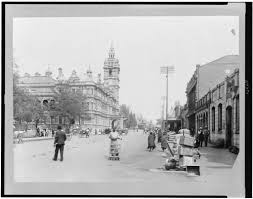Re: Upon Finishing Family Furnishings: Selected Stories, 1995-2014, by Alice Munro. New York: Alfred A. Knopf, 2014.
I have never been to a place like Alice Munro.
She is more shakeable than the tremors we have here in southern California. There is such a long memory here, in Ms. Munro, such a cold biting wind of a look down a wrong street, or a gaze over a wrong field, beneath a bridge, behind a gas station, because it's always taking you out of yourself, for now, then leaving you to deal with the flood of incidents, both regretful and splendid, loving and special, in your life, as interposed by Ms. Munro.
Her characters are lifted up and dropped down, like our anxious morning before a coffee, before the computer needs to be turned on and connect us to our desultory everydayness. At night, I often have to exert strenuous concentration in keeping to the story I'm reading because all of a sudden a memory between sadness and charm will pop up, and I'll wish I had been a better kid at the time, or I hear a phrase of my mother, or I see a moment on display of my father, and I ask How the hell did you get in here?
It's usually though where or when I regret my self. You can't stop these things, you have to ride them out and come back to them later because you're reading Alice Munro and you love her. You love whatever freezing dreariness of the Canadian bush you can get, whatever aching sorrow of Canada's own participation in the Great Depression, or World War 2, or racism, inequality, sexism, or brutality of mind that flourished(es) in the U.S. Her conscience for her characters has made me unsteady on my feet. I wonder, can I walk and think about Alice Munro at the same time?
Her Aunts Are My Aunts. I see the same people on her pages that I've know all my life, mostly from my mother's side of the family, the diversions of divorce and children born without benefit of clergy, or the ones who are too many and need to be given away. I've heard it all. And Alice Munro remembers her own and that reminds me. There is Aunt Betty, Aunt Alice, Aunt Lena, Aunt Rita, Aunt Tootie, and Aunt Gladys, all remnants of my mother's young adulthood, or more likely her girlhood. Each becoming favorites of mine because they expressed, in my presence, nothing but compassion and love.
The lock against such exclusion has always bit my cheek, but I grasp around the corner and love them all the same.
Just after midnight, when I call it a day, after a couple hours with Alice Munro, I don my CPAP mask and activate my machine to reduce the risk of heart attack due to sleep apnea. I ask myself each night, after reading her stories, Alice Munro's stories, whatever have I just read. What have I read? What on earth was it?
I also recommend Alice Munro's Selected Stories, if to begin with. You can't go wrong.














